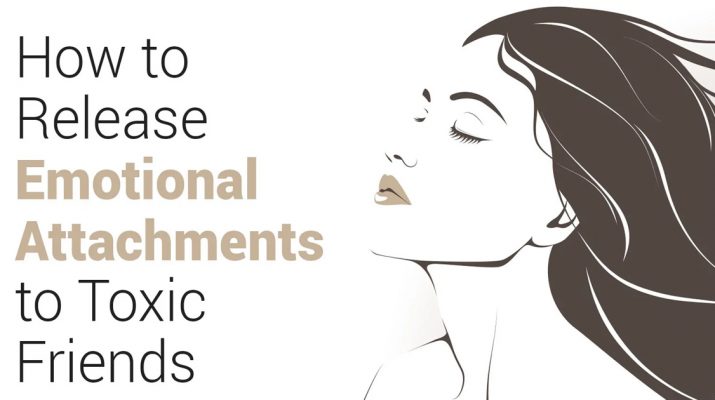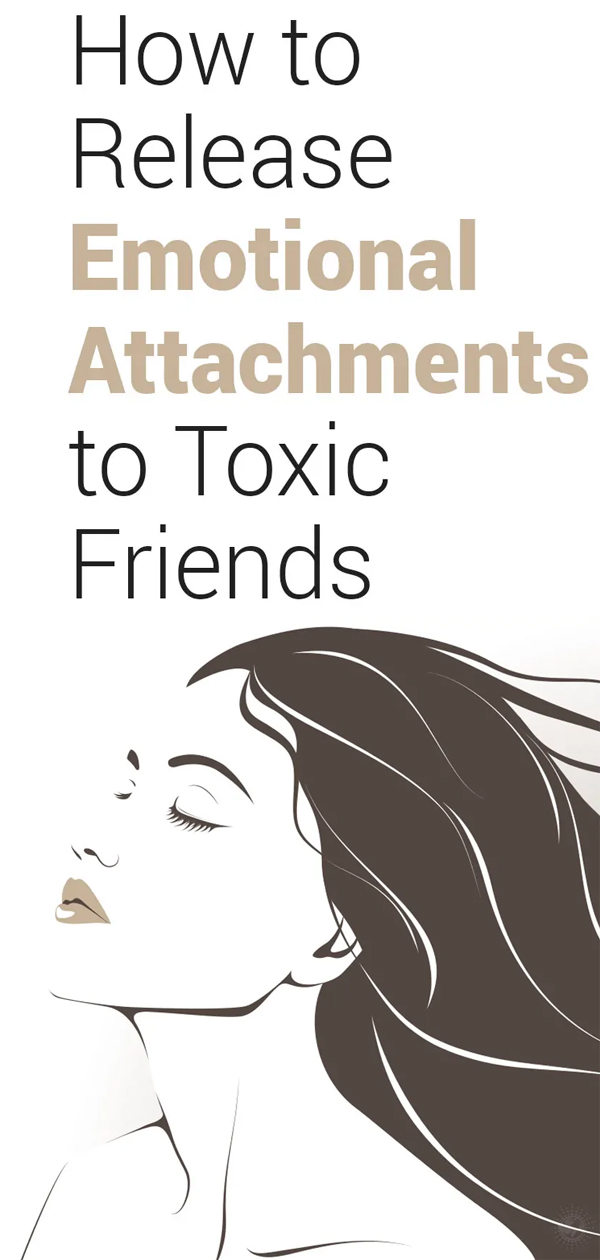Have you ever been in a lousy friendship that ruined your perception of yourself? Did it make you frightened of making other friends? Did it make you scared of saying the wrong thing? Or, did it drag you down, cause you more pain than happiness, and make you miserable overall? Toxic friends have that effect on people.
If that’s the case, then that wasn’t a real or good friendship. If you invested all your time and effort and got barely any positive benefit in return, that’s a friendship better lost. But that’s easier said than done.
Even after you cut off a toxic friend, you can still be tethered to the friendship via a strong emotional attachment. You’ve lived with this pain for so long that you’re conditioned to accept it.
Here’S How To Release Emotional Attachments To Toxic Friends
1. Start By Admitting What’s Happening
Toxic emotional attachments aren’t always thought of as addictions. Of course, in no way are we comparing them directly to alcohol, nicotine, and drug addictions. However, this doesn’t mean that you can’t be addicted to an emotional attachment, and it doesn’t mean that you won’t deny all the bad stuff to justify continuing it.
The first step in virtually any addiction support program is admitting what’s happening. You need to be aware of the toxic behavior of your friend and the way it was affecting you. Admit to yourself that this is a serious issue and that you’re in a bad situation. If you ignore it, it will only get worse and worse. Most toxic friendships do not improve.
- You need to acknowledge what is happening. You can:
- Pay attention to how interacting with your friend makes you feel
- Look for others who are dealing with the same issues as you
- Look for others who have dealt with and overcome the same problems as you
- Understand that you aren’t a bad person because you’re in a toxic friendship
- Learn to let go of guilt and focus on positive thinking (remember that blame can be toxic, too!)
Admitting what’s wrong is the first step to recovery. It’s painful, but it’s crucial.
2. Shift Your Focus To Yourself (Instead Of On Toxic Friends)
When you spend a lot of time with toxic people, you wind up focusing entirely on them, often by:
- Devoting all your efforts to keeping them happy
- Rushing to meet their demands
- Being goaded into (or resisting being pushed into) passive-aggressive interactions
- Walking on eggshells to avoid being misconstrued
- Avoiding or defusing fights
This can cause you to be totally drained, and you spend all your time focusing on them instead of yourself. This is how toxic relationships really take their toll – you invest your emotional energy on someone who doesn’t reciprocate, and your entire worldview begins to shift to center around that person.
Many people make the mistake of believing that self-focus is an inherently selfish trait, but in moderation, it’s one of the most healthy and positive actions you can take for yourself. You should be your own top priority!
But how can you shift your focus internally, especially after a long time of focusing on other people? The trick is to figure out what your wants and needs are. Ask yourself:
- How do you feel, and how do you want to feel?
- What is happening now, that is hurting you?
- What are your hopes and dreams?
- Just what is it that you want to spend your time and energy on?
- How can you improve your situation?
- How can you achieve your goals?
- What can you do to make yourself happy now?
Focusing on yourself can be difficult, but it’s an excellent way to release emotional attachments to people who should not be in your life anymore. Treat yourself well; people will come and go, but you’ll always be with you.
3. Take Up Healthy Habits
Taking care of your mental state isn’t just about being in tune with your thoughts. It’s also about taking care of your physical body. A healthy body makes for a healthy mind, and physical activity, among other things, has been proven to have positive effects on mental health. While it can’t serve as a cure-all, it can undoubtedly aid in relieving some symptoms.
A regular, healthy routine can also help you to move on from toxic attachments that could cause your mind to be preoccupied. As you work through those complicated emotions, committing to a routine can help you go through the motions every day, providing a distraction from the change in your life as you heal from the toxic friendships.
What sorts of healthy things can you add to your routine? Here are a few ideas:
- Exercise
- Eat well (cook healthy foods)
- Write, draw, or read
- Take up a new hobby or learn a new skill that you practice daily
- Make your self-care products and use them
- Adopt a relaxing self-care routine (such as soaking in a bath or applying a face mask)
- Meditation or deep breathing exercises
It’s easy to fall into the trap of not going about daily life when you’re grieving the loss of an emotional attachment, even an unhealthy one. That’s why crafting a healthy routine and distracting yourself with attention-worthy endeavors is often crucial in the healing process.
Don’t be afraid to try out a few different things to find out what will help you the best. Take a class to learn something new, try out a unique style of cooking, teach yourself to play an instrument – these are all options you can consider!
4. Don’T Be Afraid To Reach Out
Some battles are too difficult to fight on your own. Sure, it’s your fight, and you’re strong enough to take it on independently. But even the strongest warriors need a little help sometimes, and there is no shame in asking for that help.
You can find support in many different places. You might:
- Find online communities of people who have been through similar difficulties
- Talk to family members, other friends, or people who you can trust
- Speak to a mental health professional, such as a counselor, therapist, psychologist, or psychiatrist
If you’re building up the courage to talk about it to people, you can first start by expressing your emotions through other means, such as:
- Journaling
- Writing poetry, songs, or stories
- Drawing, painting, and making art
- Singing and making music
Still, make sure that you eventually find your way to a listening ear. Speaking to someone can help you to sort out your feelings, and it will remind you that you’re not alone in your struggles. Some people can lend you an ear or a shoulder!
5. Take Your Time Opening Up Again
Many people do not understand that toxic friendships can be just as harmful to one’s psyche as toxic romantic relationships are. They might force you just to move on quickly, saying phrases like:
- “It’s not a big deal.”
- “You need to make new friends now!”
- “Just use positive thinking and get over it!”
But toxic friendships can be just as painful. Many of them are even more challenging to overcome than romantic toxicity. This is due to the lack of support that can be obtained for platonic toxicity.
You should take your time to heal and recover before becoming close to others again. Rushing the process can lead to less-than-positive situations where your behavior and baggage destroy more than it builds.
However, do note that you must have the goal of eventually opening up again. You cannot use your negative experiences with this bad friendship as a stain on your entire life, or as an excuse to never be social again.
Relationship experts recommend that you slowly open yourself up to meeting new people. Don’t force friendship-type bonds; focus on making acquaintances and enjoying yourself and let friendships form naturally.
After some time of this, you can slowly try to open your heart to having close friendships once more. Take it slowly, be aware of your emotions, and keep a handle over certain impulses or fears that are leftover from the toxicity. Keep communication lines open and set definite boundaries for yourself, and you’ll manage just fine!
6. Be Hopeful For The Future
Friendships, just like any other relationship, can be complicated. As you recover, you mustn’t lose hope. The future is full of possibilities. The world may feel like it’s ending when you cut off emotional attachments to toxic friends, but it isn’t ending – it’s still spinning and going on and on and on. And you will, too!
There’s no immediate rush to get over these problems. But you’ll want to know that this positive thinking in a hopeful mindset is waiting for you in the future. You will eventually be free of these burdens and be ready to take on and face new ones.
Ultimately, you’ll want to learn that there is little in life that is certain. Being at peace with this fact can help you accept the ups and downs and stick around to see their positive ends. Of course, this is a work in progress, and it’s a lesson you’ll likely be teaching yourself for decades to come. But there’s no better time to start than now!
Final Thoughts On Freeing Yourself From Toxic Friends
Emotional abuse isn’t something that only exists in romantic or familial relationships. Friendships can come with abuse, too. The important thing is being able to discern when you’re in an unhealthy and toxic friendship so you can get out as soon as possible.
It can take time to fully move on from the turmoil of a toxic friendship. Be kind to yourself. Take your time, get in touch with who you are and what you want, and focus on your life and your personal health.
Then, when you’re ready, start to open up your heart again. We promise that there are many amazing people out there who would make amazing and incredible friends and that you’ll find the platonic relationships you’ve always dreamed of.
For now, though, you need to recover – and you’re strong enough to do so! Remember, you deserve to be treated with respect. Keep that in mind and hold onto that at you release toxic friends and through your healing journey.


